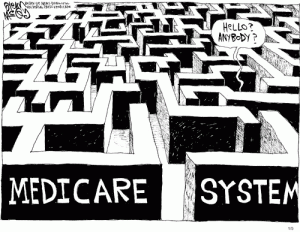By Jack Cumming
Senior living is often compared with living on a cruise ship. That is a common selling point emphasized by community marketing staff. As this is written, I am cruising the Mexican Riviera on the Discovery Princess. It’s impossible not to notice all that senior living might learn from cruising.
The Middle Market
We can begin with the untapped middle market. For years, perhaps with the Erickson exception, senior living has bemoaned its inability to figure out how to create an affordable product that might appeal to middle-income Americans. The cruise industry has this market aced.
Additionally, living in a cruise cabin is not unlike living in a mobile home park. Each cabin is modular, with many suites configured as double-wides and some few as triple-wides. Thus, developers and expansionists seeking access to the Margaritaville set might learn from the modular concepts of cruise ship construction.
Marketing
Marketing, too, is completely different. Instead of sales staff employed by the provider, cruises depend primarily on specialized, independent salespeople supported by extensive advertising and marketing materials. This provides more opportunity for prospects to connect with someone they trust and are comfortable with.
With cruising, there’s no mystery about pricing, even though it shifts from time to time and over time responding to demand. Anyone can go to a ship’s floor plan and click on cabins to find which ones are currently available and what occupancy will cost. I know of no senior living enterprise that has a marketing system that is as transparent. Moreover, just a couple of more clicks, and the unit is sold, right then, online.
Better Communications
One area that was unexpected, at least for this writer, is the Wi-Fi and other electronic services onboard a cruise ship. Many senior living communities came late to the connectivity revolution, and they often depend on local cable companies and outdated cable wiring for internet and other communication services. Cruise ships like the Discovery Princess have now shifted to Starlink, and the Wi-Fi on board is markedly better than the cable modem Wi-Fi in senior housing.
Not only do cruise ships have better Wi-Fi, but they also have a highly granular public address system. Only the most urgent messages play in cabins. I’ve never been awakened on a cruise ship by an unwelcome nocturnal announcement, though false fire alarms, especially in the middle of the night, become a cheap joke in senior housing.
Food Service
Food service is another area in which the cruise industry has been more adaptable than senior living. As you might expect, dining is a more controversial matter than some of the previous discussion. At one time, as is generally still the case in senior living, there was a dining hall in which meals were served. That has changed as the market veered toward “specialty dining.” Some people still prefer the traditional meal service, while most prefer the idea of a “specialty” venue.
Money Matters
Perhaps because the cruising industry is more business oriented and customer driven, it has adapted much more quickly than senior living. Cruising also looks to provide amenity bundles with attractive pricing to increase revenues. Lately, at least on Princess Cruises, this has meant the introduction of three pricing tiers.
There is basic cruising, “Plus” cruising, and “Premier” cruising, with many elements included in the Premier tier that are à la carte for traditional basic cruising. Perhaps because of the fast pace of business, the tiers were introduced without adequate consideration to fulfillment. The result is that staff have much more demand to accommodate without adequate resources.
Waiting an hour-and-a-half for a drink, as we did the other night, is not acceptable. The onboard staff pleaded that they had to scramble, and they did the best they could. Staff are clearly fearful of customer pushback even though it’s central office decisions that are the culprit while the onboard crew are doing the best they can.
Central Office Bloat
This brings us to a similarity from which both cruising and senior living might learn. There is a tendency to emphasize central offices (“shoreside” in cruise-speak), perhaps to gain brand uniformity or perhaps to give central office executives an on-site staff to manage. For cruising, it can mean that menus become contrived and other elements of the experience are less than what they might be.
That tendency toward contrivance may reflect the wish of central office (shoreside) specialists to try to display their expertise without feedback from customers. Some cruisers likely love the mellifluous sound of little known menu items. That can, of course, also be the case in senior living. Other customers, though, just want home cooking for everyday consumption. It can be easier to put on the dog for occasionally fancy fare, if food reflecting the warmth of a short-order cook is also available.
A Light Touch
In business lore, the best central offices — holding companies for conglomerates — are tiny. On the few occasions when expertise is needed, consultants, or freelancers, are brought in to bring an outsider’s perspective. The outsider might even conceivably be an astute cruiser discovered on board by a CEO and asked to act as a temporary shoreside adviser.
I asked a hotel director how much latitude there was for crew to learn, innovate, and improve the product, and how much they were subordinate to “shoreside” authority. The answer was laconic. “We’re paid to operate the ships.” I interpret that as meaning, “Stay in your lane, or else you’ll get caught in the meat grinder of corporate politics.” In short, mind our own business. It’s not a team. It’s a command structure.
Value Vs. Greed
One manifest result of shoreside control is that space onboard has been converted from passenger value, e.g., the Wheelhouse Bar and Salty Dog Pub, to enterprise aggrandizement, e.g., a shop with overpriced merchandise. Similar trends are sometimes found in senior living. It may simply reflect a shift from the idea of business as a mechanism to produce customer value to the notion epitomized in the movie Wall Street in praise of greed. There’s opportunity in learning from others and acting contrarian to mercenary values.









Every time I cruise I have similar thoughts. The concept of live aboard a cruise ship now is reality. Activity calendars are jammed packed and from dining rooms to buffets, the food is considerably better. The cabins are smaller yet more efficiently planned to utilize the square footage. It certainly is an industry that offers interesting models.